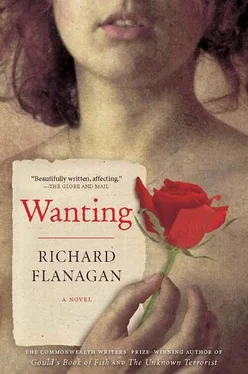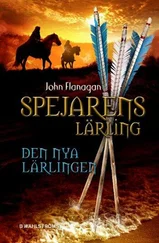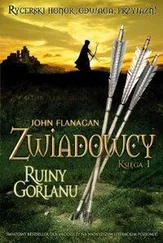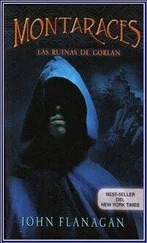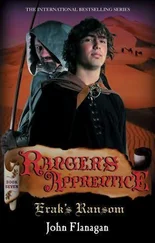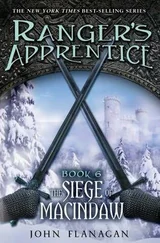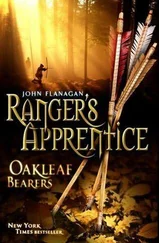‘When?’ asked Dickens.
‘Three hours ago,’ said Forster. ‘Just after we left.’
It was 1851. London’s Great Exhibition celebrated the triumph of reason in a glass pavilion mocked by the writer Douglas Jerrold as a crystal palace; a novel about finding a fabled white whale was published in New York to failure; while in the iron-grey port of Stromness, Orkney, Lady Jane Franklin farewelled into whiteness the second of what were to be numerous failed expeditions in search of a fable that had once been her husband.
A SMALL GIRL RAN FIT TO BURST through wallaby grass almost as high as her. How she loved the sensation of the soft threads of fine grass feathering beads of water onto her calves, and the feel of the earth beneath her bare feet, wet and mushy in winter, dry and dusty in summer. She was seven years old, the earth was still new and extraordinary in its delights, the earth still ran up through her feet to her head into the sun, and it was as possible to be exhilarated by running as it was to be terrified by the reason she had to run and not stop running. She knew stories of spirits who could fly and wondered whether, if she ran that little bit faster, she might also fly and reach her destination quicker. Then she remembered that only the dead flew and put all thought of flying out of her mind.
She ran past the homes in which the blackfellas lived, she ran through chooks clacking and dogs barking, past the chapel, and she kept running, up the slope of the hill to the most important building in the settlement of Wybalenna. She climbed its three steps and, as she had been shown again and again, hit the door in the whitefella way with a bunched hand.
The Protector looked up from his pneumatics lecture notes to see a small native girl enter the house. She was barefoot in a filthy pinafore and a red woollen stocking hat, and a candledrip of snot leapt in and out of her right nostril like a living thing. She looked up at the ceiling and she looked around the walls. Mostly she looked at the floor.
‘Yes?’ said the Protector. In the irritating way of her people, she looked everywhere but in his eyes. Her real name was the one he had christened her with, Leda, but for some reason everyone else called her by her native name. He was annoyed to find himself now doing the same. ‘Yes, Mathinna?’
Mathinna looked at her feet, scratched under an arm. But she didn’t say anything.
‘Well, what is it? What, child?’
And suddenly realising why she was there, Mathinna said, ‘Rowra,’ using the native word for the Devil, then quickly, like it was a spear rushing at her, ‘ Rowra ,’ and then ‘ROWRA!’
The Protector jumped off his stool, grabbed a folding knife from an open drawer and ran outside, the child making haste before him. They ran to a row of conjoined brick terraces he had built for the natives, to accustom them to English domesticity and to break them away from their own rude windbreaks. It ever pleased the Protector, who had been a carpenter before he became a saviour, how—if one didn’t think of the white beach behind, red-bouldered and leathery kelp-rimed, or the woodlands beyond, strange and twisted; if one just ignored this wretched wild island on which they sat at the edge of the world and instead concentrated on these buildings—it was possible to see that the two rows of tenements looked for all the world like some newly built street in a great modern town like Manchester.
As they approached house number 17, Mathinna halted for a moment, stared at the sky above, and seemed transfixed by some nameless terror. The Protector was about to rush past her when he saw the omen the natives feared the most, the bird that stole souls, a black swan swooping down towards the brick terraces.
Even before he was inside, the Protector was beset by a strong odour of muttonbird grease, unwashed bodies and a fear—wordless, nameless—that somehow this rotting stench related to him, to his actions, his beliefs. Sometimes the idea would come into his mind that these people he loved so much, whom he had protected from the depredations of the cruellest white settlers—who hunted them down and shot them with as much glee as they hunted kangaroo, and with as little care—that these people whom he had brought to God’s light were yet dying in some strange way, in consequence of him. He knew it was an irrational idea. A perverse, impossible idea. He knew that it came from weariness. But he could not stop the idea returning again and again. At such times he often felt headaches come on, intense pains at the front of his head so wretched he had to take to his bed.
In the post mortems he searched their split oesophagi, their disembowelled bellies, their pus-raddled intestines and shrivelled lungs for some evidence of his guilt or innocence, but he could find none. He tried to embrace as penance the stench of the pints of pus that sometimes seemed the only life force in their wretched guts. He tried to understand their suffering as his, and the day he vomited from the sight of bright mould an inch thick rising like a crop around a crater-like ulcer that ran from Black Ajax’s armpit almost to his hip, he tried to see it as some necessary reckoning of a spiritual ledger. But puking was no reckoning, and in his heart the Protector feared there could be none. In his heart he feared that this ferocious suffering, these monstrous deaths, were all in consequence of him.
He did all he could do to save them in such circumstances—God knew he could not have done more—carefully cutting up each body to try to find the cause of death, getting up in the middle of the night and cupping and leeching and blistering and, as he was about to do now to Mathinna’s father, bleeding.
The Protector opened his folding knife, wet his index finger and thumb, and ran them along the blade to clean it of the blood crust that was now all that remained above this earth of Wheezy Tom. He cut the shuddering man’s wrist carefully, scientifically, shallowly, at the point where maximum blood could be released with minimum damage.
When by candlelight each night before bed he made up his journal entry, the Protector searched for words that might be made to fit, as in another life he had made timber bend and warp to fit. He searched for a length of words that, like a batten, might act as a covering strip for some inexplicable yet shameful error. But words only amplified the darkness he felt; covered it but could not explain it. At such times he reached for prayer, hymn, familiar patterns, reassuring rhythms. And sometimes these holy words held it all at bay, and he knew why he was grateful to God, and also why he feared Him.
Blood spurted up in a small geyser, hitting the Protector in the eye then running down his face. He pulled the knife away, then stepped back, wiped his eye and looked down. The emaciated black man was groaning only intermittently now. The Protector admired his stoicism: he took to bleeding like a white man.
It was King Romeo, a man once vital and friendly, a man— the man—who had swum into the Fury River and rescued him, the Protector, when he had lost his footing trying to ford the rising waters. Yet in the wretched, sunken features, in the unnaturally large eyes, the lank hair, he could recognise nothing of that man.
He let the blood pump for a good minute, catching it as best he could in a large pannikin. As it surged, King Romeo made a low moaning noise. The black women seated on the floor in a crescent around his cot made a similar dirge at the back of their throats and the Protector knew they were much affected.
As he bound King Romeo’s wound to stem the flow, the Protector sensed the inevitability of death and the futility of his treatment, and he felt a panic take hold of him. He realised King Romeo was breathing heavily, that the bleeding was pointless, that he had wished to hurt the black man for his incurable illness, for all their incurable illnesses, for all their failures to allow him to cure them, to civilise them, to give them the chance no one else cared to give them.
Читать дальше
